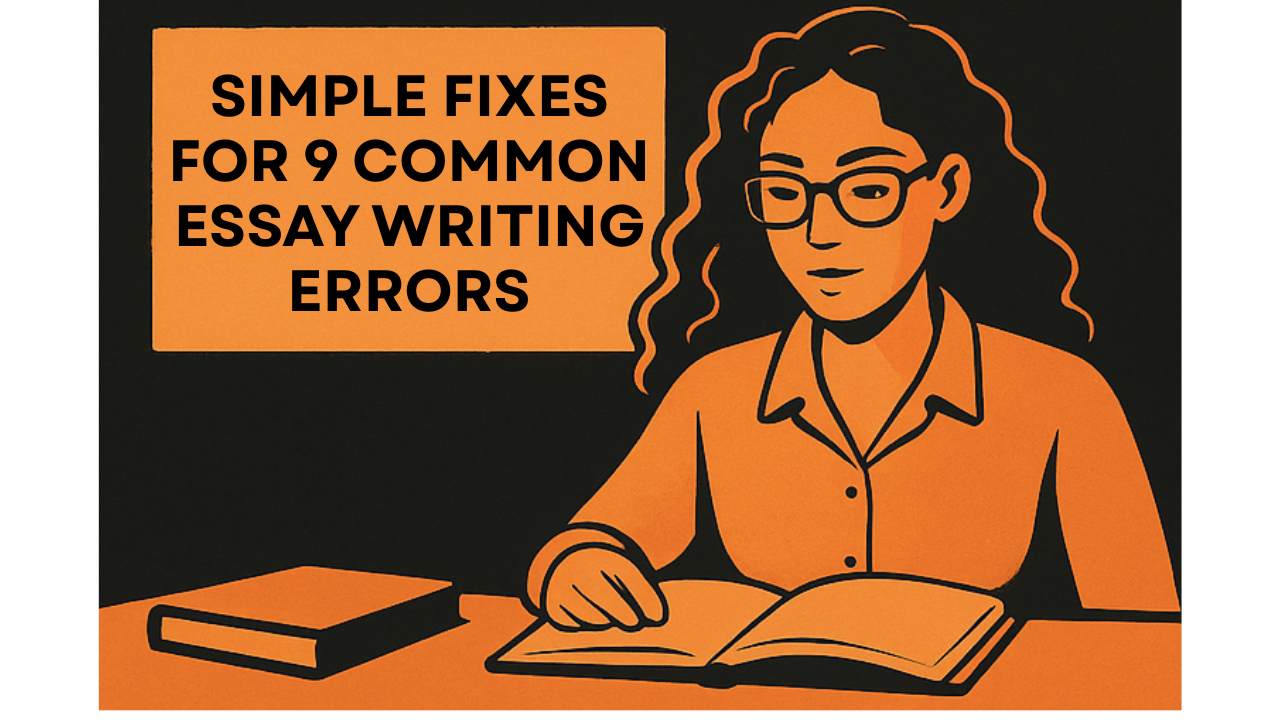Simple Fixes for 9 Common Essay Writing Errors
Essay writing often feels like navigating a challenging journey, where even minor oversights can lead to less-than-optimal academic outcomes. From glaring grammatical mistakes to subtle missteps, the path to crafting a memorable essay requires vigilant attention. Identifying and correcting these common pitfalls is crucial for producing essays of distinction.
Grammatical proficiency, a well-defined structure, and strict adherence to citation standards are not mere academic formalities; they form the fundamental pillars of effective communication. As you strive to present your arguments compellingly and persuasively, these components collectively establish the foundation of an essay that is both coherent and credible. Each step, from constructing a clear thesis to meticulously proofreading for errors, is vital to the overall success of your writing journey.
In this article, we will precisely identify the nine most common essay writing errors and their straightforward solutions, equipping you with the tools to enhance your writing. From refining your spelling and punctuation skills to mastering the art of proper citation, this guide is designed to strengthen your essay-writing expertise, ensuring that your work stands out for all the right reasons.
The Importance of Addressing Essay Writing Errors
Addressing essay writing errors is crucial for maintaining the credibility and clarity of your work. Mistakes can obscure your intended message, making it difficult for readers to follow your argument. Proofreading and editing are essential practices that help identify and correct common errors before the final submission. This enhances the overall quality of the essay and can lead to higher grades.
Avoiding common writing mistakes, such as spelling and punctuation errors, substantially improves academic essays. Utilizing credible academic resources and maintaining proper organization minimize these errors, boosting both confidence and quality in writing.
Key Writing Errors to Address:
- Spelling Mistakes: Use tools like a spell checker or spelling dictionary.
- Grammar Errors: Pay attention to sentence fragments, incomplete sentences, and the overuse of passive verbs.
- Poor Grammar: Avoid compound sentence errors and incorrect use of quotation marks.
Recognizing and addressing these errors ensures clearer communication and results in a more polished final product. Follow these steps to elevate your writing skills, making your thousands of essays more effective and ensuring they stand out academically.
Spelling and Punctuation: The First Line of Defense
Spelling and punctuation serve as the first line of defense against miscommunication in essay writing. Poor grammar and punctuation are prevalent errors that significantly diminish the clarity and impact of an essay. Students often rely solely on spellcheckers, which can overlook errors, as these tools may not catch all mistakes in grammar and spelling. Therefore, it’s essential to pair spellcheckers with traditional proofreading techniques to catch more nuanced language errors.
Misspellings can reflect a careless attitude towards writing, potentially undermining the credibility of the work. To avoid this, students should revise their essays for grammar and spelling mistakes, utilizing comprehensive dictionaries and electronic spell-checkers as additional resources.
Checklist to Improve Writing Accuracy
- Read the essay aloud to spot awkward sentences.
- Use a comprehensive spelling dictionary.
- Employ a robust grammar checker.
- Proofread manually after using digital tools.
By attentively addressing spelling and punctuation, students can enhance their essay writing skills, ensuring their academic essays communicate ideas effectively and maintain credibility.
Crafting a Clear Thesis Statement
Crafting a clear thesis statement is vital for the success of an academic essay. This singular sentence serves as a hook that draws the reader in and sets the stage for the entire essay. A well-crafted thesis should articulate a specific opinion, offering a clear direction and focus. This clarity ensures that the body of the essay aligns seamlessly with the central argument.
Key Points for a Strong Thesis
- Clarity: Use precise language to convey your main idea.
- Specificity: Avoid vague language; make your argument concise.
- Alignment: Ensure it guides the essay’s content selection throughout.
- Positioning: Include it in the introduction paragraph for context.
A weak thesis can compromise both the clarity and effectiveness of your essay, while a strong one illuminates your subject and directs your writing process. By focusing on crafting a robust thesis statement, you anchor your essay, giving it structure and coherence. This focus is essential for writing compelling academic essays.
Avoiding Plagiarism: Proper Citation Practices
Avoiding plagiarism in academic essays is crucial to maintaining integrity and giving proper credit to original authors. Proper citation of sources is essential, and students should familiarize themselves with common citation methods like APA and MLA. These styles help accurately attribute ideas and quotes to their respective sources.
One key practice is paraphrasing or summarizing information in your own words while still citing the source. This not only demonstrates a thorough understanding of the material but also helps prevent plagiarism.
Quick Checklist for Proper Citation
- Use quotation marks for direct quotes.
- Cite all sources, even when paraphrasing.
- Choose the correct citation style (APA, MLA, etc.).
- Utilize citation tools like BibGuru, Zotero, or Citation Machine for accuracy.
Direct quotes require quotation marks and an appropriate citation. Using citation tools can ensure precise and consistent citation practices. In doing so, you will enhance your essay writing skills, from crafting a strong thesis statement to maintaining quality academic writing throughout the entire essay. By diligently applying these citation strategies, students can avoid common mistakes related to plagiarism and bolster their writing skills effectively.
Structuring Your Essay for Clarity and Coherence
Crafting an effective essay requires careful planning and preparation. Without these, students often produce disorganized and poorly structured essays. To begin, it’s essential to meticulously read and understand the essay prompt. This understanding lays the groundwork for a logical essay structure.
Steps for Structuring Your Essay
- Outline Creation: Draft an outline to organize your ideas systematically. This helps in establishing a coherent flow.
- Logical Flow: Ensure each paragraph transitions smoothly, building upon the previous one and leading to a sensible conclusion.
- Signposts and Structure: Use strong signposts to guide the reader through your argument. Each body paragraph should include evidence and analysis.
- Conclusion: Conclude with a clear summary that encapsulates the essay’s arguments and insights.
Incorporating these steps ensures your essay is clear, coherent, and compelling, enhancing your overall writing skills. Remember, a well-planned essay reflects thorough understanding and preparation, resulting in a polished academic essay.
Balancing Quotes and Analysis
In essay writing, effectively balancing quotes and analysis is essential to demonstrate a thorough understanding of the topic. Over-reliance on quotes can undermine your authority, suggesting a lack of original analysis. To avoid this, quotes should be used sparingly and only when the original wording is exceptionally impactful.
Guide to Balance Quotes and Analysis
- Purposeful Use: Introduce quotes to enhance, not replace, your argument.
- Proper Integration: Use quotation marks to clearly indicate where the quoted text begins and ends.
- Style Consistency: Follow your style guide for citation to maintain academic integrity.
- Personal Interpretation: Always follow up a quote with your analysis to contextualize its relevance.
Remember, the main aim of an essay is to reflect your understanding. Use quotes to support your points, letting your voice be the primary driver. This approach not only strengthens your argument but also enhances your credibility as a writer.
Heeding Assignment Directions and Prompts
Failing to follow essay prompts or assignment guidelines is a common error that can lead to losing valuable marks or even failing the assignment. It’s crucial to read the essay prompt carefully to fully understand the requirements and respond appropriately.
Tips to Heed Essay Prompts
- Highlight Key Phrases: Mark important instructions, such as word count or specific questions, to ensure nothing is missed.
- Answer Completely: Ignoring the prompt leads to essays filled with irrelevant or vague points that don’t address the original question.
Admission readers prioritize clear communication. Straying from the essay prompt may hinder their ability to grasp your personal story and thinking. Adhering to the given guidelines ensures your essay is coherent and relevant.
Remember, heeding assignment directions is not just about following orders; it’s about demonstrating your ability to focus, interpret, and convey ideas effectively.
Using Complex Vocabulary Appropriately
When writing essays, many students make the mistake of overusing complex words, thinking it will impress their readers. However, this often leads to stiff and confusing writing. Admission readers and instructors prefer clear and honest communication over essays filled with pretentious vocabulary.
Tips for Using Complex Vocabulary
- Understand Your Audience: Use language that your audience can easily understand and relate to.
- Be Natural: Aim for a writing style that reflects how you naturally speak.
- Use Words Sparingly: Incorporate fancy words only when they add value and clarity.
- Focus on Clarity: Prioritize clear communication over trying to sound scholarly.
By avoiding the pitfall of unnecessary complexity, students can produce essays that are both effective and relatable. Always remember, clarity and authenticity are key in strong academic writing.
The Necessity of Proofreading
Proofreading is a crucial step in the writing process, particularly for academic essays. One common mistake students make is neglecting this essential task. Effective proofreading involves reviewing and correcting errors in grammar, punctuation, and syntax. By taking the time to proofread thoroughly, students can significantly enhance the quality of their essays.
Reading content aloud during proofreading is a beneficial strategy. This practice helps identify mistakes that might be easily missed when reading silently. Furthermore, leveraging grammar and spell-checking tools can aid in catching basic errors. However, it’s important to remember that these tools are not infallible, so manual checks are also necessary.
Setting aside dedicated time for proofreading is vital. This commitment leads not only to improved essay quality but also often results in better grades. Students should prioritize proofreading in order to avoid common essay writing mistakes like sentence fragments and poor grammar.
Proofreading Checklist
- Read the essay aloud.
- Use grammar and spell-checking tools.
- Allocate specific time for proofreading.
- Check for sentence fragments and incomplete sentences.
- Ensure the use of proper academic language.
In summary, diligent proofreading is indispensable for producing polished and compelling academic work.
Conclusion: Elevate Your Essay Writing Skills
Improving essay writing skills requires dedication and a methodical approach, much like honing any craft. Avoid common essay writing mistakes such as procrastination, poor organization, and plagiarism. Embrace continuous feedback and practice to enhance your academic writing abilities.
How to Elevate Your Essay Writing Skills
- Plan and Research: Allocate dedicated time for planning and researching your essay topic to build a strong foundation.
- Organize Your Thoughts: Create a clear outline to avoid poor organization in your essay.
- Focus on Strong Thesis Statements: Develop a thesis that clearly presents your argument, anchoring your entire essay.
- Revise and Proofread: Utilize tools like plagiarism checkers and spell checkers to eliminate spelling and grammar errors.
- Seek Feedback: Regular feedback can highlight common errors like sentence fragments and misused quotation marks.
- Practice Consistently: Write thousands of essays over time, practicing compound and complex sentences to improve fluency.
By following these steps and allowing AI essay generators and proofreading software to mitigate common writing errors, you can significantly improve your writing skills. Embrace the writing process with dedication, and you’ll find your essay quality reaching new heights.

